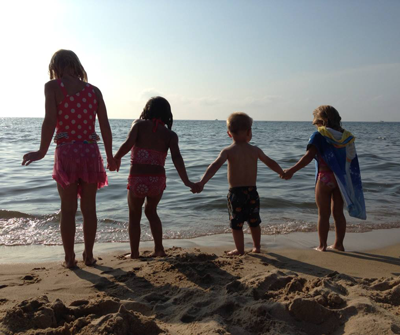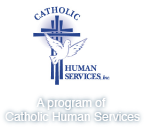Frequently Asked Questions from Birth Parents
Are the services for birth parents at CHS free?
Yes. There are no fees or costs at any time.
Can CHS help with my expenses?
Yes. We’ll assess your financial situation to help you cover basic needs such as medical costs, clothing, and housing. All financial support goes through the agency. It’s best that no money changes hands between adoptive and birth families to ensure that no coercion occurs.

Do I have to be Catholic?
No, we provide services to all regardless of faith.
How much control do I have in a plan for adoption?
You are in control every step of the way. Our job is to support and guide as you follow your plan for you and your child. You are welcome to meet as many families in our pool as you want before you make a selection. You decide who will attend the birth. You determine the level of openness that’s right for you. You will decide with the adoptive family how often to visit and work out in advance the exchange of emails, phone calls, and pictures.
If I choose adoption, does it have to be open?
No. Your privacy is always respected. We do hope that after you meet your selected adoptive family, you will want to stay in touch. If not, that’s okay, too. But we believe that it’s important for adopted children to have knowledge and a sense of their birth heritage whenever possible.
Can I come to CHS even if I might not choose adoption?
Yes. Dealing with an unplanned pregnancy, especially in stressful circumstances, is extremely difficult and confusing. We’re here to help you sort out your situation and support you in whatever direction you decide to go. You know what’s best for you and your child.
How much will I know about the adoptive family?
Just as much as you’d like. Every waiting family creates a sizeable portfolio full of pictures and lots of detailed information so that you can get a feeling for them before you meet. We also will provide you the family’s home study report which goes into detail about their family backgrounds, careers, interests, etc. There is a great deal of openness in the process. And once you meet them, we encourage you to ask them anything you like.
What “qualifications” must an adoptive couple meet before they are accepted?
Every family goes through an educational process and through a home study. The home study is conducted in their home and takes into account their motivation, marriage, family of origin, thoughts on raising children, and their ideas about adoption. We collect references and send to Lansing a computer clearance regarding any criminal convictions and child abuse incidents.
Where do the adoptive families live?
Right here in northern Michigan. We feel that open adoption relationships can work best when adoptive and birth families don’t have to travel great distances to see each other.
What is the adoptive family allowed to know about me?
Everything except very private details that you may wish to keep to yourself. We think transparency is of enormous benefit to your child. If adoptive parents are going to answer the youngster’s questions, they need full and accurate information. When everyone is well informed, there are no “half secrets” to work around.
Who names my baby?
You choose the name that goes on the baby’s original birth certificate. The adoptive family chooses the name that goes on a new birth certificate after the adoption is finalized several months after the baby is born. For the original birth certificate, birth mothers sometimes choose the name the adoptive family selects in advance. For the second birth certificate, adoptive families sometimes select the name that the birth mother has chosen. And often, the birth and adoptive families work together to name the baby. It can be quite a creative process.
Can the birth father be involved?
We hope so because we know how important fathers are to their children. We would like to know as much about him as we do about the mother. Medical, genetic, and social information about him is of great interest and importance to the child. If the situation is right, it can be wonderful for both birth parents to work as a team if they wish.
Will I be able to see my baby in the hospital?
Absolutely! We hope you will spend lots of time with your baby. It’s important for you to greet your child and celebrate her existence. Take all the time you need to savor this fantastic experience. Love him up! Take tons of pictures. Be bossy and assert your needs and wishes—you do everyone a favor by making your wishes clear.
When do I sign the adoption papers?
Temporary papers allowing the baby to go home with the selected adoptive parents are signed at the hospital. Our usual routine is to go to court to sign permanent papers about four weeks after the baby’s birth. We think that’s about right. It is long enough to give you time to catch your breath and think things through very carefully, yet short enough that the prospective adoptive parents can survive the disappointment if you have a change of heart.
Will I have to go to court?
Yes, and it’s not as bad as it sounds. The judge is your friend and protector. He or she is not there to judge you. Rather, the judge’s job is to make sure everything is done properly and to make sure you know what you’re doing. Unfortunately, not all states are as careful about adoption as Michigan is.
What if I change my mind?
It’s very important for you to understand how this works. The temporary papers signed in the hospital are easily set aside. You are completely free to change course prior to signing papers in court (about four weeks following birth). Your baby would be returned to you. However, once you sign the consent papers in court, your parental rights would be terminated. By law, you would have 21 days to appeal, but only if fraud or duress were present. It’s very rare for adoptions to be undone.
What else should I know about?
Whether or not you move ahead with adoption, we give you a lot of credit for looking into it. It’s not the best outcome for everyone, but it’s a life-preserving answer for some. We have learned through the decades to do adoption well. We handle it in a way that pretty well meets the needs of everyone involved (most notably the child), but that certainly doesn’t mean that it is simple or easy. You need to know that adoption is an indescribably painful decision to make and carry out. Sometimes people sugarcoat it, but the truth of the matter is that it involves an indescribable loss. The fact that it’s painful doesn’t make it bad—the right thing is often painful—it just means that it’s painful. You owe it to your baby to work hard in her behalf. Don’t for a minute settle for less than the best. Find a great agency to help you think things through and then find a great adoptive family. You are important to your child, and we hope you will remain an important person always.

